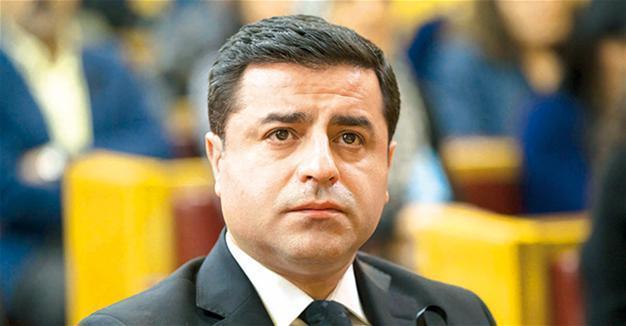Court rules for continuation of arrest of HDP co-chair Demirtaş
DİYARBAKIR

A court in the southeastern province of Diyarbakır ruled for the continuation of the arrest of Peoples’ Democratic Party (HDP) co-chair Selahattin Demirtaş on April 5.
The Diyarbakır Eighth Heavy Penal Court ruled for Demirtaş to remain in jail, where he is held on several charges including “managing a terrorist organization.”
In the monthly hearing evaluating the arrest of Demirtaş, who has been under arrest since Nov. 4, 2016, the court ruled that he should remain in prison as his defense has not yet been taken, the charges against him are catalog crimes, and the possible sentence he is going to receive does not correspond to the time he has so far spent in prison.
The Supreme Court’s Fifth Penal Chamber on March 29 decided to transfer the HDP co-chair’s case file to the Ankara Heavy Penal Court, citing security reasons.
In the case that was opened by Diyarbakır Chief Public Prosecutor’s Office, Demirtaş is accused of “managing a terrorist organization,” “making propaganda of a terrorist organization,” “opposing the law on assembling and demonstration,” “openly inciting people to hatred and enmity,” “inciting people to not follow the rules,” “inciting people to commit crimes” and “praising a crime and a criminal,” and faces between 43 and 142 years of prison.
A total of 13 lawmakers from the HDP, including its co-chairs Demirtaş and Figen Yüksekdağ, face hundreds of years in jail over alleged links to the outlawed Kurdistan Workers’ Party (PKK).
Meanwhile, the HDP’s Kurdish-language referendum song “Bejin Na” (Say No) was banned across Turkey by a court in the southern province of Mersin. The Mersin Second Penal Court of Peace ruled that the “No, no to single flag, no to single nation, no to single language” lyrics of the song were against the constitution.
The decision was conveyed to all HDP provincial and district offices across Turkey.
“The song is against the article of the constitution stating that: ‘The Turkish state, country and nation are an indivisible unity. Its language is Turkish,’” the court ruled.
Turkey will hold a referendum on April 16 to decide whether to change the current parliamentary system to an executive presidency with vastly enhanced powers for the president.
The “yes” vote is endorsed by President Recep Tayyip Erdoğan, the ruling Justice and Development Party (AKP) and the leadership of the Nationalist Movement Party (MHP), while the main opposition Republican People’s Party (CHP) and the HDP are campaigning for a “no” vote.
 A court in the southeastern province of Diyarbakır ruled for the continuation of the arrest of Peoples’ Democratic Party (HDP) co-chair Selahattin Demirtaş on April 5.
A court in the southeastern province of Diyarbakır ruled for the continuation of the arrest of Peoples’ Democratic Party (HDP) co-chair Selahattin Demirtaş on April 5.